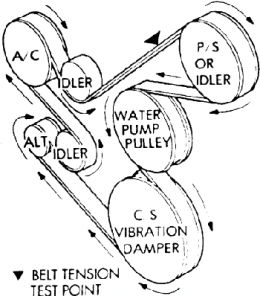 Your serpentine belt is a long belt that’s driven by your engine. It winds around several accessories that power important automotive systems. Let’s go over them.
Your serpentine belt is a long belt that’s driven by your engine. It winds around several accessories that power important automotive systems. Let’s go over them.
- First, the serpentine belt drives your air conditioning system.
- Next, the belt powers the alternator.
- The serpentine belt may also run the pumps for both the power steering and power brakes. In some vehicles, power steering may have an electric drive and power brakes can be vacuum driven.
- On many vehicles, the serpentine belt powers the water pump ( on some cars, the water pump is powered by the timing belt).
Your service technician can perform a visual inspection of the belt to see if it has any cracks that signal the belt could fail soon and also measure the amount of belt material to make sure there is enough.
There’s a special, spring-loaded pulley attached to the engine called the tensioner pulley and sometimes an extra pulley called the idler pulley. Their job is to make sure there’s a constant tension on the serpentine belt so that it doesn’t slip. The spring can become worn and no longer provide the necessary pressure to keep the belt tight. That’s why it’s often recommended that the tensioner, and the idler pulley, if so equipped, be replaced at the same time as the serpentine belt.
All in all, the serpentine belt’s an important part for the function of your vehicle and it’s not as expensive to replace as you might think. So it’s good to do your serpentine belt replacement before it fails.
Give us a call and let us help you.
